On tuesday January 10th 2005, in the University of Sorbonne, Paris, Saywan Barzani has defended his thesis in politicial science : The Iraqi Kurdistan Question, 1991-2005.
Jury was composed with as pro-Kurds scholars as more general specialists of the Middle-East, the debates were so quite interesting, to show how the Kurdish question is considered in the highest levels of jurists and specialists in policy and geostrategy.
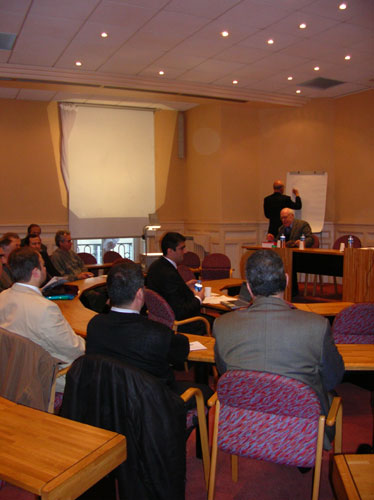
(By waiting for the seance start, we could see Bernard Dorin far end in the room, to draw, as usually, a Kurdish map. It allowed me to recognize him, at a great distance and just seeing his back…)
Saywan Barzani exposed the subject of his thesis and his arguments :
This thesis is the continuity of his work of DEA (pre-thesis French diploma) : The Strategy of the political institutions in Iraqi Kurdistan. It is thus the resumption and the continuation of his analysis about this exceptionnal period concerning 2 countries, Iraq and Kurdistan. The situation of an autonomy de facto which started in Kurdistan after 1991 and the Gulf War, was for Kurds a great opportunity, though resulting from a combination of circumstances. The period from 1991 until nowadays is absolutely new in the Kurdish history, and new for international Law. It was a political “windfall”, but it has had only an existence “in reality” : Kurdistan remained without legal statute, it was neither a mandate nor a protectorate… and however, it was not any more, in fact, a part of Iraq.
These years were rich in events, sometime tragic, always difficult, but paradoxically, they will contribute to strengthen the position of the Kurdish government. This period was rarely evoked or studied for itself, but as a part of the Kurdish Question in general, or with the periphery of the Iraqi question.
Saywan Barzani added that of course, his own interest and his personnal engagement in the Kurdish cause motivated the choice of the subject, but he was aware too that these reasons could be a trap also, for his own objectivity.
Concerning the methodology of this research, it was characterized by a lack of sources. Then he has checked local and international press, some books, and beside has to move as an observer and an investigator on the ground, and has discussions with the actors of this period, in spite of the difficulties related to a climate of war and also with the fact that many negotiations were secret. The limits of this research then comes from the lack of written sources or still inaccessible files. Thus he depended on witnesses’ sincerity or their goodwill to speak.
The thesis begins with the origins of the Kurdish cause and the disputed creation of Iraq in 1920, by Brittons. This introduction seemed essential to him, in the aim to make understand the situation of 1991, and why that the population of Kurdistan always asserted a certain autonomy of government, with a need for political institutions and recognition.
But the Safety Area set in a part of Kurdistan after the Gulf War had not any legal definition. From a geography point of view, it did not even correspond to Kurds’ settlement, who inhabite beyond the zone, and did not correspond even to the Parallel 36°.
Liberated Kurdish areas were ruled by a two-party system shared between the KDP and the PUK. A good part of the thesis details the causes and the steps of this inter-Kurds’ conflict. According to Saywan Barzani, it was more a conflict between Iran, Turkey and Iraq, which took Kurdistan for their battlefied, than a conflict having intrinsic roots in the Kurdish society. The three States tried to maintain the balance between the both Kurdish movements. But paradoxically, this war had had positive effects. For the belligerent neighbours supported economically the Kurdish country, which was under a strict embargo, 300% more severe than in Iraq. Their support allowed Kurdistan, though the civil war, to consolidate and set up its institutions.
In 2003, the Americans came back in Iraq and suppressed the Baathist regime. So Kurds passed from a situation of survival to a strategy of consolidation of their assets. The most recent stage is the unification of the Kurdish government, the last week
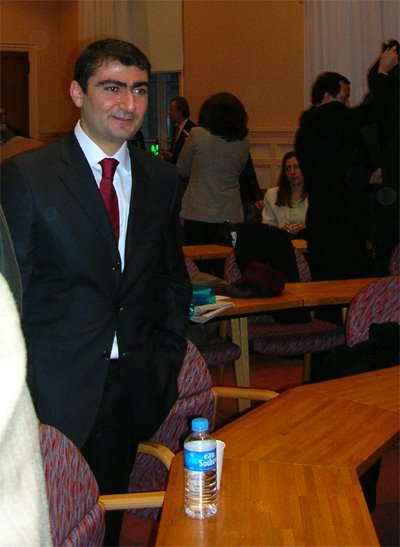
Joyce Blau, first rapporteur :
” I would like initially to congratulate the candidate, in the name of all the assembly, for the courage which he had to achieve his thesis, in parallel with his functions of representative of the Kurdish national movement in France. Moreover, hardly 10 years ago, Saywan did not speak French and he writes now in a polished language. Then I am very happy to see him, defending his thesis in this prestigious place.
Now, I am going to speak about the assets of the researcher : Saywan belongs to one of the most prestigious family of Kurdish notables. He is originated from the area of Barzan, which was a sufi center soufi, a center of studies and reflexion. I just would like to add that Barzani’s Long Walk toward the USSR after the fall of Mahabad, this walk through mountains, in zigzag, with thousands of peshmergas, is still studied in the French Military Academy in France.
The history of its family is related to the Kurdish national history, and his own history is linked to the history of Kurdistan. He is borned at the Iranian border, in the HQ of the Kurdish national movement. A few months before his birth, in September 71, his grandfather, Mustafa Barzani, survived miraculously after a kamikaze’s attack: some mollahs, undoubtedly manipulated by Saddam, brought to him corans as gifts. Their belts were full of explosives which burst in the room where Mustafa Barzani received them.
In 1975, after the collapse of the Kurdish revolt, Saywan, who was 3 years old, went with his family in exile to Iran, in the Kurdistan of Iran, like thousands of refugees. He studied in a Persian school, since the teaching of Kurdish is not allowed. Then Saber, his father, in charge for wounded and ill people, had to return to Iraq, where he lived under house arrest. Saywan then studied in an Arab school.
In 80s, repression and Anfal happened. Saywan Barzani survived miraculously, whereas his father, his uncles, his cousins, were massacred. In 1991, he studied in the university of Salaheddin and in 1994, he obtained a grant of the Kurdish institute to study law in France. He passed his DEUG in Orleans, then his Bsc and his Master in political sciences and finally his DEA in La Sorbonne.
When he arrived in Paris, he became the representative of the KDP, and the office of the KRG in France. There, his contacts and his political activities were useful for his thesis. He speaks Arabic, Persian, Kurdish, French, and then has an access to multiple sources.
The great adventure told in his thesis started in 1991, at the end of the Gulf War, whereas Baath did not disarm, with the crushing of the Shiite insurrection and the Kurdish exodus. A great movement in the public opinion, initiated by Bernard Kouchner led to the operation Provide Comfort.
In the same time, Baghdad withdrawed suddenly its army from Kurdish areas, and the leaders of Kurdistan had to rule immediately a country large like Switzerland, devastated by chemical war and bombardments, in a hostile environment, with an indifferent international community. Like Saywan Barzani says : “at that time, Kurdistan resembled an animal reserve. It was not comparable with any former experiment.”
The thesis is a description of how the Kurdish leaders had to face this problem. It analyzes also the problems arising from the lack of a clear statute for the area. Which legal form was it necessary to evoke for the new Kurdish political entity? Lastly, his conclusion is that this situation was finally an asset for the Kurds. Because two regional powers, Turkey and Iran, ceased their agreement against Kurds, but each country supported one of both parties. So it allowed the perpetuation of Kurdistan
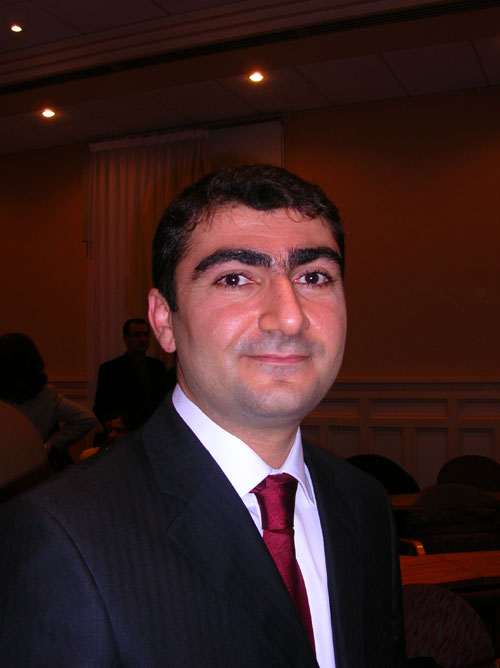
Roger Tebib, secund rapporteur :
” I also congratulate the candidate for his thesis, carried out with a clever and passionate way. But beside these congratulations, I am saddened of what has been done (and especially not done!) for Kurdistan, and that a country of 25 million inhabitants with a so high culture, remains without State, unknown and not internationally recognized. At an international level, this quibblings since 1920, about Kurdistan, is a lamentable hypocrisy. Nowadays everybody speak about minorities, and some countries with very few inhabitants have a seat in UNO, and not the Kurds, who are 25 million!
There is also the problem of the ignored culture of Kurdistan. Thus Saladin, this Kurd, whose origin is occulted or left side… When one speaks about Kurdistan there, when I speak to my colleagues about it, they think only of the PKK, i.e. a terrorist movement. It would be necessary nevertheless to change the historical point of view and knowledge.
I would like to give you some advices, for your future researches. You should analyze what did (in fact nothing!) the Security Council of UNO since Provide Comfort, and to look further into the actions of the KDP for a liberal nationalism. Because it is really the party which can and does something for Kurdistan. With regard to the regional conflicts, I would have also wished you’ve detailed the role of the Iraqi services which infiltrated Kurdistan, as well as the relation of the humanitarians with the Kurdish Question. ”
“You made a remarkable work,. Your thesis is rigorous, not at all manichean, contrary to the majority of the theses on the Middle East, which have often a “white and black point of view”. Of course I have not had the feeling that you are member of the PUK * laughter *, but it is intellectually honest.
The Kurdish case is interesting, because it shows well that there is no justice in the international relations. With the end of the Othoman Empire, the Kurds were handicapped by their historical delay comparing with two groups, Persians and Turks, who had a long official and historical State tradition. Kurds, contrary to Mustafa Kemal, were not aware of the transition to the national states era.
Since I was interested in the Kurds in 1959, I always known them in misfortune. And now, you study the first favorable moment for Kurds in the Middle East. Things were done little by little, in a short-sighted way, and Kurds knew to draw the best party from it. You say that, unwillingly, the internal competition make possible the survival of Kurdistan. It is an interesting assumption, a strategist’s point of view.
Perhaps, on the PA and the administration of Paul Bremer, I would have wished a greater insistence on the harmful effects than had the dissolution of the Iraqi army and on the political error which was this absolute marginalisation of Sunnites
Saywan Barzani’s answer :
“I was for the dissolution of this army, corrupted and directed by a minority (as one saw with the elections, Sunnites are a minority in Iraq). If American had maintained the Iraqi army, there would have also the problem of the military service, which Kurds could not accept. For the situation of demobilized men, it was not an army of professionnals except officiers, thus soldiers’ wages were not a problem, but it is true that they should have found a solution for the officers, who are without resources.
The problem is that Americans did not destroy the structures of the Baath Party. They concentrated on only 55 high leaders, whereas there are thousands of criminals free in the country. Then Baathists could have reconstituted their networks in a few months.
As for the marginalisation of Sunnites, since the elections, they have the same number of seats than Kurds in Parliament.”
” I also address my congratulations to you, for the large mass of documents and researches in your thesis. I am also struck by his effort of objectivity, very remarkable, which I did not expect. It doesn’t tell the story of “the good KDP against the bad PUK”.
2 important points: at first, Kirkuk. I would have liked to see a map of its pipeline. Kirkuk is an essential point for the Kurdish future, especially for its economic future. Its pipeline passes by the south of Turkey to the sea and the Turkish port of Ceyhan which has to receive the pipeline and the gas of Baku-Tiflis.
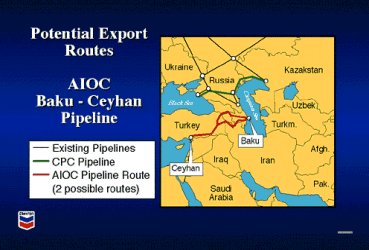
If in 2007 this question, the question of Kirkuk, is resolved in a favorable way for Kurds, it will be a very good thing.
On the paradox of “the civil war which was an asset” : I accept it partly, but I believe all the same that the war had effects more negative than positive. The peshmergas fought each others, there were thousands of deaths, wounded, and moarning families. It has a bad impact at an international level and in the public opinion.
But it is a constant factor in the history of the Kurdish groups. Perhaps it would have been necessary to precise that when the Kurds revolt against a State, they turn naturally to the neighboured State (thus the Shah of Iran supporting Mustafa Barzani in 1975 and KDP-iran supported by Saddam Hussein). I remember this Kurdish proverb quoting by my friend Bedir Khan: “When a man drowns, he seizes anything on the bank, even a snake”.
Now the maps: the British encyclopaedia’s one… shows that there are Kurds apart from Kurdistan, but it is a little plain.

The best on the Kurdish settlement in the world is in a Soviet atlas. Because Brittons were not “innocent” by tracing this map, whereas the Soviets showed more details on the popualtion in Kurdistan, as well as the other minorities.
In October 2005, I was invited by Massud Barzani. I was with the former Foreign Minister of Quebec, at Nêçirvan Barzani’s home. Massoud Barzani said: “We will not accept a situation less good than the one we have today.” And I noticed an independence de facto in Kurdistan : I did not see an Iraqi flag, I did not hear a shot.
I visited on the grave of Mustafa Barzani in the village of Barzan, which was destroyed and rebuilt. It was a very simple tomb, with 2 steles. He seemed to take care on its village as on its people.”
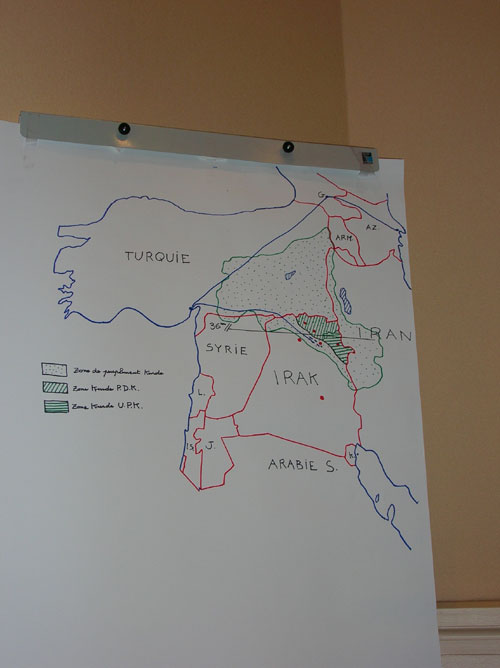
Saywan Barzani’s answer :
“I know that the term “assets” for the civil war can seem shocking, but it allowed indeed to overcome the embargo, when the belligerent neighbors supported their sphere of influence. In fact it was almost a Turco-Iranian war in Kurdistan. Their armies even directly clashed in 1997. We should not be forgotten that the embargo was more severe in Kurdistan than for Iraq, and that Kurdistan was destroyed at 95%. When some rumour ran that one of both countries, Iran or Turkey, was going to close its border for the importation of products, prices increased in one day from 200 to 300%. Because of the war, Turkey opened its borders, and allowed trade, movement of goods, like people’s one.”
Charles Zorgbibe, dir. of the thesis :
“I congratulate the student for his maturity. His work is written in a clear, elegant language. And his thesis is very objective. I have just a slight remark : of course, it is a thesis of a political science, and not about Law, but I would have liked that the legal aspects of the evoked situation would be more detailed.
Concerning the Safety Zone, I think that it is the most important application of the “right of interference” which was made up until now. Resolution 688 is the only resolution emanating of the Security Council on this subject, and then has a great legal force. We should not forget that since the end of the Cold War, the Security Council tells the international law.
You write that since 2003, “Iraq does not exist any more as a State.” I don’t agree, on the contrary, it is necessary to note the fascination of the American legal advisers for their former occupation in Germany. Germany was never removed as a State in 1945, but only the German government. So the American Resolution on Iraq, which UNO adopted, is an imitation of the American occupation in Germany in its first paragraph, whereas its 2° paragraph is an imitation of the American occupation in Korea…
About the future: how do you see it? Will there be a reorganization of the Middle East and the raising of an official Kurdish state ?
Michel Lesage, Chairman of the seance :
I’ve found again all the qualities that I appreciated in this candidate when I directed his DEA. I was impressed by his objectivity, his abundant documentation, the very useful and interesting appendices.
I would like to have more precise details on the legal qualification of the “phenomenon” Kurdistan. It is not a State but it is not far to be one. It would like to compared it with other situations, Taiwan or Québec.
And I would also wish to know your vision of the future?
Saywan Barzani’s answer :
“Juridically, there was no exact definition : the Kurdish zone was neither a protectorate, nor a mandate, it had nothing to do with Kosovo, or East Germany… It was a “natural reserve”. This nation had the right to survive, and that was all. The truth was : “we are independent but we must not tell it.”
For the future: The Americans want for the moment to preserve the so-called unity of Iraq. In Sunnite area, there is a big safety chaos. Shiites want a federated State federated, and for this sytem Kurds are in advance of 15 years on the rest of the Iraqi federation. A powerful and centralized Iraq is impossible, even for the customs or the police forces. For example, no Iraqi police officer, no Iraqi soldier, has the right to penetrate in Kurdistan, whereas the reverse is true, Kurds enter to Iraq, under another uniform! And Kurdistan will have its own army. Each federate state will probably keep 90% of power, and will let 10% of them to Baghdad. Since divorce is prohibited, then it will be a judicial separation and I believe that Iraq will remain on the maps as a country, but Iraq without the protection of the United States cannot survive, between Iran and Turkey. And under an international protection, there is no real independence. Like a proverb says it, “the hand that you can’t break should be kissed.”
The thesis received a Very Honourable mention with unanimous congratulations of the jury (the highest in French universities).

tkaya agar datwani dagai wa thesam bo bnera
thesa bi fransî nûsî bû. Ew li Pirtukxaneya Zankoya Sorbon e û li Entituya Kurdî jî ye.
[…] Roj Bash has a fabulous post detailing the defense at the University of Sorbonne, Paris, of Saywan Barzani’s thesis in politicial science : The Iraqi Kurdistan Question, 1991-2005. […]
[…] Roj Bash has a fabulous post detailing the defense at the University of Sorbonne, Paris, of Saywan Barzani’s thesis in politicial science : The Iraqi Kurdistan Question, 1991-2005. […]
Great work!
Did you also attend the Kurdish conference in Paris arranged by Pace? Or?
I didn’t have time to read it all , but I will.
No, I don’t assist to all the Kurdish conferences in Paris, lol, there are too much…
Are the Kurds so active there?? There are not much Kurds in France.. I thought..
Not numerous than in Germany,perhaps 100/130.000 ? but it is not so difficult to have freely a Conference room in the National Assembly.